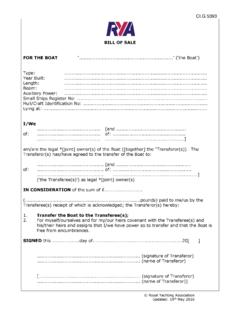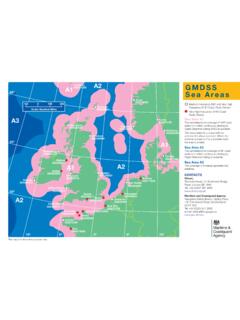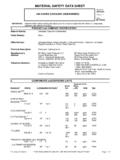Transcription of CARRIAGE AND STORAGE OF PETROL & DIESEL CARRIAGE …
1 Royal Yachting Association Updated: 1 October 2014 Page 1 of 5 CARRIAGE AND STORAGE OF PETROL & DIESEL CARRIAGE OF PETROL & DIESEL FOR PRIVATE USE: The CARRIAGE of PETROL or DIESEL by private individuals in a vehicle where the fuel is intended for their personal or domestic use, including their leisure or sporting activities, is exempt from the general restrictions on the CARRIAGE of dangerous goods by road. However, where fuel is carried in refillable containers filled by or for a private individual, the total quantity transported must not exceed 240 litres at a time and each individual container must not contain more than 60 litres.
2 In addition, the individual must take measures to prevent the containers from leaking. Notwithstanding the general limit of 60 litres per container, it is worth noting that the individual local authority petroleum licence under which a filling station operates may impose a limit on the capacity of individual containers that may be filled with fuel at that filling station. In addition, filling station operators can apply their own limits on the capacity of individual containers that may be filled with fuel. CARRIAGE OF PETROL & DIESEL IN A WORK CONTEXT: The CARRIAGE of PETROL or DIESEL by individuals in a vehicle in the course of a work-related activity is exempt from the general restrictions on the CARRIAGE of dangerous goods by road provided that the following provisions are complied with:- The total quantity of fuel transported must not exceed 333 litres ( PETROL ) or 1,000 litres ( DIESEL ).
3 The fuel must be transported in individual containers that comply with the relevant United Nations Economic Commission for Europe ( UNECE ) specifications and are marked with the UN number for PETROL (UN1203) or DIESEL (UN1202), as appropriate; The containers must be stowed in the vehicle so as to avoid damage or loss from the vehicle; The vehicle driver must be given general training in accordance with UNECE specifications, which include how to respond in the event of an emergency; The vehicle must carry a 2kg fire extinguisher designed for tackling flammable liquid fires.
4 STORAGE OF DIESEL There are no specific legal requirements on how to store DIESEL or the quantity allowed either in workplaces or domestic premises. STORAGE OF PETROL STORAGE CONTAINERS Current regulations provide that PETROL must be stored in suitable portable containers , a demountable fuel tank or a fuel tank connected to an internal combustion engine in the way it would ordinarily be connected when the engine is running. Royal Yachting Association Updated: 1 October 2014 Page 2 of 5 Suitable Portable Containers Suitable portable containers are containers that are designed and constructed so that: they are made of metal or plastic that is suitable and safe for the purpose and will not significantly degrade due to exposure to PETROL or naturally-occurring ultra-violet radiation; they are reasonably robust; they are not liable to break under normal conditions of use; the escape of liquid or vapour is prevented.
5 PETROL can be poured safely from them; and they are not unsteady when placed on a level surface. Such containers must be: in a good state of repair; secure from leaking; not degraded from exposure to chemicals or light; and marked or labelled in a legible and indelible form with:- o the words PETROL and highly flammable ; o an appropriate hazard warning sign, : o the nominal capacity in litres; o manufacturer s name; and o date and month of manufacture. The nominal capacity of suitable portable containers must be no greater than: 10 litres, if made of plastic; or 20 litres, if made of metal, although the total capacity may exceed the nominal capacity by between 10% and 15%.
6 Demountable Fuel Tank Demountable Fuel Tanks are fuel tanks for the internal combustion engines of motor boats or similar vessels that are designed so that they can be safely removed from and re-affixed to the engine without leaking fuel. The maximum quantity of PETROL that may be kept in a demountable fuel tank is 30 litres. STORING PETROL IN A VEHICLE: 30 litres of PETROL may be stored permanently in a vehicle. This STORAGE must be in a single demountable fuel tank or no more than two suitable portable containers. PETROL contained in the normal fuel tank of a vehicle does not count towards this total.
7 STORING PETROL IN A BOAT: 30 litres of PETROL may be stored permanently in a motor boat. This STORAGE must be in a single demountable fuel tank or no more than two suitable portable containers. Royal Yachting Association Updated: 1 October 2014 Page 3 of 5 PETROL contained in the normal fuel tank of a motor boat does not count towards this total. If the normal fuel tank is a demountable fuel tank, it must be properly connected to the engine in order for the amount of fuel contained within it not to count towards this total.
8 STORING PETROL IN DOMESTIC AND NON-DOMESTIC PREMISES: The following amounts may be stored at domestic premises ( at home) and at non-domestic premises ( club-houses) that are not workplaces (see below): Up to 30 litres of PETROL may be kept in one STORAGE place, without having to notify the local authority. PETROL may be stored in a single demountable fuel tank, one or more suitable containers or a combination of both, provided that no more than 30 litres is kept. Between 30 and 275 litres may be kept in one STORAGE place, provided that the local authority (in its capacity as the Petroleum Enforcement Authority) is notified in writing of the name of the occupier of the STORAGE place and the address of the premises where the PETROL is kept.
9 This notification must be renewed annually. PETROL may be stored in one or more demountable fuel tanks, one or more suitable containers or a combination of both, provided that no more than 275 litres is kept. PETROL stored in quantities of between 30 and 275 litres must be kept in a STORAGE location that is a detached building or is attached to a building (other than domestic premises). Fire extinguishing and spillage containment apparatus must be available either within the STORAGE place or as close as is reasonably practicable to the STORAGE place.
10 More than 275 litres may be stored in one STORAGE place provided that the local Petroleum Enforcement Authority has issued a licence to the occupier of the premises. Note: Any quantity of PETROL stored in a fuel tank in a vehicle or motor boat will not be included in the volume of PETROL kept in a STORAGE place, provided that the fuel tank is connected to an internal combustion engine in the way it would ordinarily be connected when the engine is running. Otherwise, PETROL stored in a vehicle or a boat counts towards these totals.













